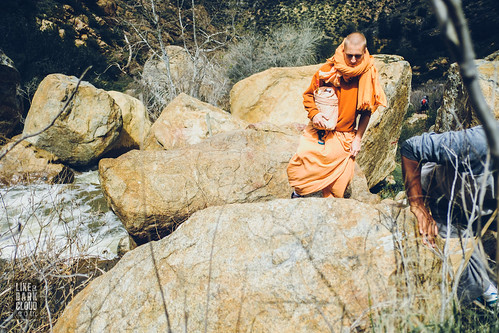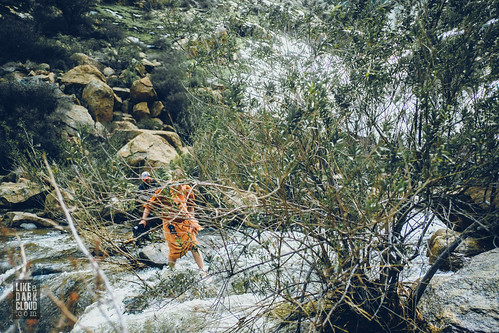
Veda course in Bhaktivedanta Manor, UK.
A Three Month Residential Course for Men.
The residential Veda Course is designed ...
Websites from the ISKCON Universe

Veda course in Bhaktivedanta Manor, UK.
A Three Month Residential Course for Men.
The residential Veda Course is designed ...
Again listening to Srila  Prabhupada’s talks in Juhu, I was struck by his frank and realistic assessment: “What do they know about nation? Everyone is interested in his own pocket, that’s all. ‘What money is coming in my pocket.’ Where is the nationalism? If there was nationalism, how such havoc could have happened? There is no feeling of nationalism, because they are not thinking of the nation; they are thinking of their own pocket. Where is the nationalism? These are simply bogus slogans. Actual unity, nationality, universality, is in Krishna consciousness. It is a fact. Let them see. Men, women—we do not hate anyone. ‘Come on. Take to Krishna consciousness.’ ”
Prabhupada’s talks in Juhu, I was struck by his frank and realistic assessment: “What do they know about nation? Everyone is interested in his own pocket, that’s all. ‘What money is coming in my pocket.’ Where is the nationalism? If there was nationalism, how such havoc could have happened? There is no feeling of nationalism, because they are not thinking of the nation; they are thinking of their own pocket. Where is the nationalism? These are simply bogus slogans. Actual unity, nationality, universality, is in Krishna consciousness. It is a fact. Let them see. Men, women—we do not hate anyone. ‘Come on. Take to Krishna consciousness.’ ”
Srila Prabhupada ki jaya!
Hare Krishna.
Yours in service,
Giriraj Swami
 By Bhakti Madhurya Govinda Goswami
By Bhakti Madhurya Govinda Goswami This is, this is the poetry and also the full knowledge of Srimad Bhagavatam, and so we can get that by milking the surabi cow of Srila Prabhupada purport. That’s what happens in the opening statement by Srila Prabhupada, it’s in once sense it’s a shocker I don’t know if you caught that. It’s a shocking statement. I will read it again because that’s why I like to go through these purports incumbently because that way we can milk the most out of it. We will cover the whole purport but want to make sure this extraordinarily points and then understand why this opening statements by Srila Prabhupada are shocker. Continue reading "From Sri Mayapur Chandrodaya Mandir – Srimad Bhagavatam class, March 1, 2017
→ Dandavats"

“Choosing to Offend” (6 min video)
We have to avoid all offenses against vaishnavas. When we offend a vaishnava… Krishna, He can tolerate some offense, He can forgive someone for offending Him. But He can’t forgive someone who offends a vaishnava.
Watch it here: https://goo.gl/IausKR

Practicing Tolerance.
Vaisesika Dasa: As with practitioners of other skills, those who consciously take up the practice of tolerance develop a greater capacity for it.
Unlike the practice of many other talents however, to practice tolerance one needn’t go anywhere or buy anything, as ample opportunities to exercise one’s toleration muscle come unsought.
A first step in the practice of tolerance is to prepare oneself to welcome disturbances when they arise.
As the Dalai Lama puts it, “In the practice of tolerance, one’s enemy is the best teacher.”
Acting on such sage advice, once while my friend and Godbrother, Satyadeva Prabhu and I were touring through Japan, we were obligated by circumstance to travel for many hours in a car alongside an unruly child. At first, we both felt frustrated and disturbed. However, when we decided to take our encounter as a chance to practice tolerance, we felt relief and soon, we were both smiling after nicknaming our restless prepubescent travel mate, “guruji.” At the end of the trip, we both thanked guruji for teaching us tolerance.
In the Gita, Lord Sri Krishna lists tolerance among nineteen other vital elements on the path to spiritual knowledge. (Bg. 13. 8-12)
One who practices tolerance gains a unique perspective to see how circumstances come and go and also sees that he or she is not the master of them. Admitting that I am not the supreme controller is not only foundational to advancing in spiritual life; it is also a great relief.
Some synonyms for the word tolerance are: open-mindedness, broad-mindedness, forbearance, liberality, patience, charity, and understanding. (Sounds nice, right?)
Try greeting the day with a determined aim to tolerate some unfavorable news, a difficult person, or some awkward circumstance. Not only will you be surprised at how many opportunities you’ll get, you may also be stunned by the spiritual insight you gain just from this one simple practice.
Those who practice tolerance not only become spiritually wise, they also please Krishna.
“The Lord is very satisfied with His devotee when the devotee greets other people with tolerance, mercy, friendship and equality.” (SB 4.11.13)
“One who is not envious but is a kind friend to all living entities, who does not think himself a proprietor and is free from false ego, who is equal in both happiness and distress, who is tolerant, always satisfied, self-controlled, and engaged in devotional service with determination, his mind and intelligence fixed on Me-such a devotee of Mine is very dear to Me.” (BG 12.13-14)
Varnasrama Series

Famous Hip Hop Rapper Waka Flocka Flame receives Srila Prabhupada’s books.
Dharmaraja Das distributes books to famous Hip Hop Rapper, Waka Flocka Flame, who has been practicing vegetarianism for a few years now!
Srila Prabhupada ki jaya!
 By Braja Vilas das
By Braja Vilas das Yet another year has passed in our lives as we approach Gaura Purnima 2017, and we wish to take this opportunity to once again thank you for your support and encouragement. Your dedication has inspired us spiritually, and has helped us practically to achieve our goals and maintain the construction pace over the years. In many ways this is the real New Year celebration for all ISKCON devotees, as we observe Mahaprabhu’s appearance and make our vows and commitments to continue to help expand His mission throughout the world and deepen our own Krishna consciousness. Continue reading "Gaura Purnima Message 2017 from the TOVP
→ Dandavats"

OUR FAMILY BUSINESS - a new ebook in all flavors, for all devices.
Vaisesika Prabhu’s super-successful book about the art of transcendental book distribution, “Our Family Business”, is now available as an ebook in all flavors, for all devices. What if you could build your devotee community, deepen your Krishna consciousness, give others the opportunity to learn about bhakti, and perform the dharma of the age all at the same time?
In this very readable book, Vaisesika Dasa discusses why we should join the family business of distributing transcendental knowledge through the written word, as well as how book distribution benefits distributors, the devotional community, and all those who receive one of Srila Prabhupada’s books.
Our Family Business makes it clear that every devotee and every service is part of the sankirtana effort. Even if book distribution is not your primary service, expect to be enlightened, encouraged, and enlivened by reading this book.
Get it now!
bbtmedia.com:
http://bbtmedia.com/en/ebook/en-ofb
Google Play:
https://play.google.com/store/books/details?id=ej0QDgAAQBAJ
iBookstore:
https://itunes.apple.com/us/book/id1202903656
Amazon:
www.amazon.com/dp/B01MUUUMEZ
Hare Krishna!
Your servants at bbtmedia.com
 By Purushottam Kumar
By Purushottam Kumar Yudhisthira, an Indian king, who ruled about 5000 years ago once said that the most astonishing thing in this world is that people see others are dying every moment but they never ever believe that one day they too would die Continue reading "Journey Back Home
→ Dandavats"
 By Chaitanya Charan das
By Chaitanya Charan dasAction is what catches our attention. For example, in a cricket test match, when the action slows down as the batsmen start playing defensively, our interest sags. But when the action rises – the bowler delivers a googly that clean bowls the batsman or the batsman hits a huge six, for example – then our attention peaks effortlessly. Continue reading "How can we improve our concentration during meditation?
→ Dandavats"
 By Mathuresha Dasa
By Mathuresha Dasa While Lord Krishna enjoys the informality of intimate dealings at home with devotees who are in the mood of family and friends, in the office of creator Lord Maha-Vishnu attracts worshipers who prefer a God primarily endowed with grand, omnipotent, awe-inspiring features. Maha-Vishnu’s caliber is inconceivable. To illustrate, the Bhagavad-gita and other texts say that not only are we not alone in the universe, but the universe itself is not alone. Past the enormously distant shell of our own universe are an uncountable number of others. These innumerable universes, in a form described variously as seeds and golden eggs, float from the pores of the skin of Maha-Vishnu as He lies sleeping on the Causal Ocean, a body of transcendental water that separates the spiritual and material realms. Maha-Vishnu breathes out, and the universes come into being for trillions of years. He breathes in and absorbs all the universes and their inhabitants back into His body until His next exhalation in the cycling of creation. Continue reading "Time and Again
→ Dandavats"

5 Gems from Bhaktisiddhanta Saraswati Thakur.
Chaturatma Dasa: While studying about Madhavendra Puri I came across these gems. Bhaktisiddhanta Saraswati Thakur says that there are 5 primary counter examples we should learn from Ramachandra Puri: (1)Faultfinding, especially finding fault in Vishnu and the Vaishnavas, is extremely detrimental to ones spiritual advancement. A devotional practitioner should look at his own faults rather than at others. By correcting his own faults, he will be able to make some advancement.

Some thoughts on ‘Fast Breaking’
Hari Parshad Das: Sometimes, I’ve seen devotees ask other devotees or myself about the Ekādaśī fast breaking time. While I do understand that the convention is to use the phrase 'fast breaking’ and I have no problems with anyone using it, I should also in a humble way say that this phrase does not do justice to the original Sanskrit term — 'vrata-pāraṇam’.
The English term 'breakfast’ originally came from the old English term 'undernmete/morgenmete’, which means meal at 9am / meal at morning. This was because the body would be fasting from all food at night during sleep and the morning meal at around 9am would break that fast.
The term vrata however does not exactly mean 'fasting’. Vrata means 'vow’. Fasting (upoṣaṇam) is one of the activities of a vow. The day of an Ekādaśī vrata is ideally supposed to be free from all other encumbrances; a day dedicated to giving that well deserved loving one-pointed attention to the love of our life — Krishna.
The term pāraṇam means 'successful completion’. (Hindi = पार लगाना)
Thus, the term vrata-pāraṇam literally means 'successful completion of vows’. We’re not supposed to break our vows. We’re meant to complete them.
On the pāraṇa day (dvādaśī), we take permission with a heavy heart from our beloved deity to go back and be absorbed in our day to day work. The devotee completes his/her ekādaśī vows by praying:
ajñāna-timirāndhasya
vratenānena keśava
prasīda sumukho nātha
jñāna-dṛṣṭi-prado bhava
Translation: Lord Keśava! Please bestow favor on this insignificant soul blinded by ignorance and kindly bestow the eyes of divine knowledge as a result of following this [Ekādaśī] vow.
— (Hari-bhakti-vilāsa 13.231)

Sex, Drugs, Rock & Roll | Highlights (2 min video)
Highlights from our awesome flagship event yesterday at King’s university with special guest Kadamba Kanana Swami, put together by Filmwork Studios.
Watch it here: https://goo.gl/e0rY8H
किसी वस्तु को स्पर्श करने, चखने, सूंघने, देखने तथा सुनने से इन्द्रियों को सुख मिलता है| आज पूरी दुनिया इन पाँच स्रोतों से सुख भोगने के पीछे भाग रही है| भौतिकवादी जीवन का यही एकमात्र उद्देश्य है|
भौतिकवाद भोगवाद को बढ़ावा देता है| भौतिकवाद वस्तुओं को ऐसे सुन्दर-सजीले रूप में प्रस्तुत करता है कि वे और अधिक आकर्षक बन जाती हैं| इस प्रकार हमारी भोग-इच्छा रूपी अग्नि में ईंधन का काम करती है| तकनीकी प्रगति और मीडिया का दुरूपयोग करके कामुकता को बढ़ावा दिया जाता है| लोगों को इस भ्रम में डाला जाता है कि वे इन वस्तुओं को प्राप्त करके सुखी हो सकते हैं| परन्तु अधिकांश लोग इन भोग वस्तुओं के पहुँच से दूर रहते हैं| इस प्रकार, चारों ओर प्रदर्शित भोग-वस्तुएँ लोगों की अतृप्त वासनाओं को बढाने में ईंधन का कम करती है और उन्हें जलाती रहती है|
यद्यपि हम इस भोगवादी प्रचार को नहीं रोक सकते, किन्तु व्यक्तिगत रूप से इसपर रोक लगा सकते हैं| अर्थात्, बुद्धि कि सहायता से मन में उठने वाले विचारों पर अंकुश लगा सकते हैं| मूल रूप से हम सब आत्मा हैं और सर्वाकर्षक भगवान् श्रीकृष्ण के सनातन प्रेम में आनंद लेना हमारा अधिकार है| हमें यह ज्ञान देकर भगवद्गीता हमारी बुद्धि को सशक्त बनाती है|
आत्मा के रूप में हम स्थाई एवं सनातन हैं और यह संसार अस्थाई है| भगवद्गीता (२.१४) बताती है कि हमें सर्दी-गर्मी, सुख-दुःख आदि के अस्थाई स्वभाव को समझकर उन्हें सहन करना चाहिए| हमें लगता है कि हमें केवल दुखों को सहन करना है और सुखों का भोग करना है| फिर गीता क्यों हमें सुख-दुःख दोनों को सहन करने के लिए कहती है? क्योंकि ये दोनों एक ही सिक्के के दो पहलू हैं| जितना अधिक हम सुखद परिस्थितियों में भोग करेंगे उतनी अधिक हमारी चेतना भौतिक संसार में लिपटने लगेगी, और फिर अप्रिय परिस्थिति उत्पन्न होने पर हमें उतना ही अधिक दुःख होगा| इसलिए हमें सुखों को भी सहन करना है| सहन करने का अर्थ है कि हमें सुखों की बढ़ा-चढ़ाकर कल्पना नहीं करनी है और आवश्यकता से अधिक उसमे संलग्न नहीं होना है| सुखों को सहन करने से हमारी चेतना सांसारिक बंधन से मुक्त होने लगती है|
क्या सहन करने का अर्थ सबकुछ छोड़ना है? भक्तिमार्ग पर सहन करने का अर्थ सबकुछ छोड़ना नहीं होता| भक्तियोग हमें श्रीकृष्ण से जोड़ता है और हमें इस संसार के भोगों से कहीं अधिक सुख प्रदान करता है|
हे कौन्तेय! क्षणभंगुर सुख-दुःख का आना और समय के साथ उनका चले जाना, यह सर्दी और गर्मी के आने-जाने के समान है| हे भरतवंशी, ये सुख-दुःख इन्द्रिय-स्पर्श से जन्म लेते हैं| मनुष्य को चाहिए कि विचलित हुए बिना इन्हें सहन करना सीखे|
(भगवद्गीता २.१४)
The post १२. इन्द्रियों की अग्नि में ईंधन न डालें appeared first on The Spiritual Scientist.
आजकल अनेक सैल्फ-हैल्प पुस्तकें सलाह देती हैं – “अपनी दृष्टी बदलिए, सकारात्मक सोचिये|”
सकारात्मक सोच निश्चित ही अच्छी है, परन्तु हमारी सोच तभी पूर्ण सकारात्मक हो सकती है जब हम न केवल अपनी सोच को अपितु अपने दृष्टिकोण को भी बदलें| अर्थात्, हम कैसे देखते हैं, इसके साथ-साथ हम कहाँ से देखते हैं, वह भी महत्वपूर्ण है|
मान लीजिए हम किसी ऊँची इमारत के नीचे खड़े हैं| हम स्वयं को बौना महसूस करेंगे| परन्तु यदि हम हवाई जहाज में बैठकर उसके ऊपर उड़ने लगे तो वही इमारत छोटी हो जाएगी| इमारत वही है परन्तु अब वह छोटी लगने लगी है| यह केवल सोच बदलने से नहीं अपितु दृष्टिकोण बदलने से हुआ है| अधिकांशतः दृष्टिकोण बदले बिना केवल सोच बदलने का प्रयास कल्पना होती है| जब तक हम उस ऊँची इमारत के नीचे खड़े रहेंगे हम उसे छोटी नहीं देख सकते|
भगवद्गीता आरम्भ में ही हमारा दृष्टिकोण बदलती है| कैसे? हमारी स्थिति बदलकर| भगवद्गीता हमें हमारे परिवेश एवं परिस्थितियों से ऊपर उठाकर हमारी सोच को बदलती है| गीता (२.१३) में बताया गया है कि मूल रूप से हम अविनाशी आत्मा हैं और भौतिक जड़ वस्तुओं से भिन्न एवं श्रेष्ठ हैं| जिस भौतिक शरीर को हम अपनी सच्ची पहचान मानते हैं वह हमारी आत्मा के ऊपर पड़ा हुआ एक अस्थाई वस्त्र है|
हवाई जहाज में उड़ते समय धरती पर होने वाली उथल-पुथल हमें प्रभावित नहीं कर पाती है| हम जानते हैं कि हम उनसे कहीं ऊपर हैं| हाँ, हवाई जहाज पर धरती से मिसाइली हमला करके उसे नष्ट किया जा सकता है, परन्तु हमारी आत्मा किसी भी भौतिक साधन द्वारा नष्ट नहीं की जा सकती है| चाहे कितना भी बड़ा खतरा क्यों न हो, वह हमारी आत्मा को हानि नहीं पहुँचा सकता| और हम भक्तियोग के पालन द्वारा स्वयं इसका अनुभव कर सकते हैं|
जब भी इस संसार की समस्याएँ और नकारात्मकताएँ हमें घेर लें तो हमें केवल यह स्मरण करना है कि हम अविनाशी हैं| यह बदला हुआ दृष्टिकोण हमारी चेतना को शान्ति एवं विश्वास से भर देगा| तब न केवल हमारी सोच अपितु हमारा जीवन भी सकारात्मक हो जायेगा|
जिस प्रकार देहधारी आत्मा निरन्तर इस शरीर में बाल्यावस्था से युवावस्था में तथा युवावस्था से वृद्धावस्था में जाती है, उसी प्रकार मृत्यु के पश्चात् यह दूसरी देह में प्रवेश करती है| धीर पुरुष इस परिवर्तन से भ्रमित नहीं होते|
(भगवद्गीता २.१३)
The post ११. केवल सोच को नहीं, दृष्टिकोण को बदलिए appeared first on The Spiritual Scientist.
कई बार जीवन की जटिलताओं में उलझने पर हम दूसरों की सहायता लेने से हिचकिचाते हैं| भय लगता है कि कहीं लोग हमें मूर्ख न कहें| परन्तु उस उलझनभरी भयभीत अवस्था में हम अकसर मूर्खताभरे कार्य कर बैठते हैं| हमारी अज्ञानता हमें गलत चुनाव करने पर बाध्य करती है|
उलझनों में किस प्रकार साहस का चुनाव किया जाये, यह भगवद्गीता के आरम्भ में दिखाया गया है| अर्जुन के सामने एक अत्यन्त हृदय-विदारक उलझन थी| उसे अपने उन सम्बन्धियों के साथ युद्ध करना था जो अधर्मी बन चुके थे| अधिकांश योद्धा यही कहते हैं – “योद्धा का कर्तव्य युद्ध करना है|” कोई संशय नहीं कि अर्जुन एक पक्के योद्धा थे, परन्तु वे एक सामान्य योद्धा से ऊपर थे| उनका हृदय कोमल था, विचार संवेदनशील तथा बुद्धि शास्त्रों द्वारा निर्देशित| वे भली-भांति जानते थे कि अकसर जीवन की उलझनें व्यक्ति को दोराहे पर ला खड़ा करती हैं| क्या सही है और क्या गलत, वे निर्णय नहीं कर पाते| अंततः, धर्म क्या है यह जानने के लिए वे श्रीकृष्ण की शरण लेते हैं| (२.७)
दोनों सेनाओं के लाखों सैनिक आमने-सामने खड़े थे| अर्जुन जैसे सुविख्यात हीरो सार्वजनिक रूप से किसी की शरण लेना लज्जाजनक लगेगा, परन्तु अर्जुन ने वही किया जो अत्यावश्यक था| उन्होंने अपनी ख्याति को महत्व नहीं दिया| युद्ध करने और न करने का निर्णय जीवन और मृत्यु का निर्णय था| यह निर्णय न केवल उन्हें अपितु उनके अनेक सम्बन्धियों तथा वहाँ जुटे लाखों सैनिकों को प्रभावित करने वाला था|
हो सकता है अर्जुन द्वारा श्रीकृष्ण कि शरण लेना उनकी मूर्खता को दर्शाये, परन्तु इस कार्य ने उन्हें परम बुद्धिमान और ज्ञानी बना दिया| श्रीकृष्ण के मार्गदर्शन में उन्होंने सही निर्णय लिया और धर्म की स्थापना में मुख्य भूमिका निभायी| इतना ही नहीं, अर्जुन द्वारा पूछे गए प्रश्नों के उत्तर से ऐसे कालातीत ज्ञान ने जन्म लिया जो अनंत समय तक मानव समाज को दिशा दिखता रहेगा|
जब जीवन कि जटिलताएं हमें उलझा दें तो हम भी अर्जुन के समान अपनी प्रतिष्ठा के विचार को निःसंकोच एक किनारे रख सकते हैं| श्रीकृष्ण की शिक्षाओं तथा उनके प्रतिनिधियों का अनुगमन करके हम भी संरक्षण तथा दिव्य ज्ञान की शक्ति प्राप्त कर सकते हैं|
मानसिक दुर्बलता के कारण मैं भ्रमित हो गया हूँ और मेरे मन का संतुलन नष्ट हो गया है| कृपया निश्चित रूप से बताएँ कि इस स्थिति में मेरे लिए क्या श्रेष्ठ है| मैं आपका शिष्य हूँ और आपकी शरण में आया हूँ| कृपया मुझे उपदेश दें|
(भगवद्गीता २.७)
The post १०. मूर्खताभरे कार्य करने से अच्छा अपनी मूर्खता स्वीकार करना है appeared first on The Spiritual Scientist.
कुछ लोग कहते हैं, “भगवद्गीता सिखाती है कि किसी व्यक्ति की हत्या करने में कोई बुराई नहीं हैं, क्योंकि एक-न-एक दिन वैसे भी शरीर की मृत्यु होने वाली है|”
सामान्य व्यक्ति की यही सोच है| परन्तु गीता इसलिए हत्या की अनुमति नहीं देती क्योंकि शरीर विनाशी है, अपितु इसलिए क्योंकि कई बार धर्म की रक्षा करने हेतु हिंसा आवश्यक हो जाती है| गीता आत्मा के अविनाशी तथा शरीर के विनाशी स्वभाव का वर्णन करती है जिससे अर्जुन भावुकतावश अपने धर्म से पथभ्रष्ट न हो|
आइये शल्यचिकित्सा का उदाहरण लें| कोई भी व्यक्ति समझ सकता है कि यदि डॉक्टर ऑपरेशन द्वारा किसी पीड़ित रोगी का कोई सड़ा हुआ अंग काटता है तो वह उचित है| भगवद्गीता भी यही कहती है| रोगी व्यक्ति के जीवन की रक्षा के लिए उसके एक अंग को काटना उचित है|
आइये कुरुक्षेत्र युद्ध के सन्दर्भ में इस उदाहरण को देखें| उस समय समाज कि दशा एक पीड़ित रोगी के समान थी और अर्जुन शल्यचिकित्सक के समान| कौरव लोभ और द्वेष के कारण सड़े अंग बन चुके थे| उन्होंने छल-कपट से पाण्डवों का राज्य हड़प लिया था| चूँकि सामान्य लोग राजाओं और नेताओं का अनुगमन करतें हैं इसलिए कौरवों की दूषित मानसिकता के शीघ्र ही समाज में फैलने का खतरा पैदा हो गया| कौरवों ने पाण्डवों द्वारा भेजे गए सारे शांति-प्रस्ताव ठुकरा दिए| उनका रोग असाध्य बन चुका था और पूरे समाज को बचाने के लिए उन्हें काटना एकमात्र रास्ता बचा था|
अर्जुन द्वारा युद्ध से भागना किसी शल्यचिकित्सक द्वारा ऑपरेशन करने से मना करने जैसा है| श्रीकृष्ण शल्यचिकित्सक के मार्गदर्शक थे जिन्होंने शल्यचिकित्सक के हृदय-दौर्बल्य से ऊपर उठने में उसकी सहायता की| गीता (२.२) इंगित करती है कि ऐसी अनावश्यक हृदय दुर्बलता किसी भी जिम्मेदार व्यक्ति को शोभा नहीं देती, चाहे वह योद्धा हो या शल्यचिकित्सक|
गीता की शिक्षाओं से अर्जुन को बल मिला| अंततः (१८.७३) वे न केवल युद्ध करने अपितु श्रीकृष्ण की इच्छानुसार कार्य करने के लिए सज्ज हो गए| यह दर्शाता है कि वे अपने कर्तव्य को हिंसा के रूप में नहीं देख रहे थे| वे समझ गए कि समाज के दीर्घसूत्री कल्याण हेतु श्रीकृष्ण की एक योजना है और उन्हें उस योजना में केवल अपनी भूमिका निभानी है|
श्रीभगवान् ने कहा – हे अर्जुन! तुम्हारे मन में यह अशुद्धता कहाँ से प्रवेश कर गयी? जो मनुष्य जीवन के वास्तविक मूल्य को जानता है उसे इस प्रकार की बातें शोभा नहीं देती| इस प्रकार की बातों से मनुष्यों को उच्चतर लोकों की नहीं वरन् अकीर्ति एवं अपयश ही प्राप्त होता है|
(भगवद्गीता २.२)
The post ९. शल्यचिकित्सा हिंसा नहीं है, हितकारी है appeared first on The Spiritual Scientist.
भगवद्गीता (१.४३) में अर्जुन कहते हैं कि वंश-परंपरा नष्ट करने वाले सदा के लिए नरकवास करते हैं|
कुछ धर्म-शास्त्रों के अनुसार पापी व्यक्ति सदा के लिए नरकवास करता है| क्या भगवद्गीता भी इसके पक्ष में है?
नहीं, अर्जुन के इस कथन को हमें पूरी भगवद्गीता के सन्दर्भ में समझना होगा| तभी इसकी सराहना कर पाएंगे| गीता (८.१५) में संपूर्ण भौतिक जगत को अस्थाई कहा गया है| चूँकि नरक इस भौतिक जगत का हिस्सा है, वह भी अस्थाई है| यदि नरक सदा के लिए नहीं रहता फिर ग्रंथों में ‘स्थाई नरकवास’ कि बातें क्यों कही गयी हैं? गीता के अगले श्लोक (८.१६) में कहा गया है कि इस भौतिक जगत में कोई भी व्यक्ति किसी एक स्थान पर स्थायी रूप से नहीं रहता| उसका आवागमन लगा रहता है| दूसरे शब्दों में, वह नरक से बाहर भी आता है|
फिर ‘स्थायी नरकवास’ का क्या अर्थ हुआ? यह कथन वंश परंपरा को नष्ट करने तथा संसार कि सामाजिक एवं आध्यात्मिक व्यवस्था को खंडित करने की गंभीरता का वर्णन करता है| व्यक्ति को इस जघन्य कार्य के इतने दीर्घकालिक परिणाम भोगने पड़ते हैं कि एक दृष्टि से वह काल अंतहीन प्रतीत होता है| इसलिए ‘स्थायी नरकवास’, इस शब्द के शाब्दिक अर्थ को नहीं लिया जा सकता| उदहारण के लिए, शास्त्रों में भौतिकवादी व्यक्ति के लिए ‘आत्मह’ (आत्मा कि हत्या करने वाला) शब्द का प्रयोग किया गया है| यद्यपि आत्मा अवध्य है, तथापि जो व्यक्ति सांसारिक विषयों में उलझकर आध्यात्मिक प्रगति कि ओर ध्यान नहीं देता उसके लिए आत्मह शब्द का प्रयोग किया गया है| गीता भगवान् के स्वभाव का वर्णन करती है| भगवान् के स्वभाव को समझकर हम जान पाएंगे कि ‘स्थायी नरकवास’ का प्रयोग केवल शाब्दिक है| श्रीकृष्ण किसी क्रोधी न्यायाधीश के समान नहीं हैं जो नास्तिकों को सदा के लिए नरक-अग्नि में झोंकते हैं| वे इतने दयालु मित्र हैं कि परमात्मा रूप में नास्तिकों सहित प्रत्येक जीवात्मा के हृदय में निवास करते हैं| किसी को नरक में झोंकने कि बात तो दूर, जब जीवात्मा अपने कर्मों के कारण नरक में जाता है तो उस समय भी भगवान् उसके साथ जाते हैं| और वे सही दिशा का चुनाव करने में उसकी सहायता करते हैं जिससे वह उनके नित्यधाम पहुँचकर सदा के लिए सुखी हो सके| इसलिए नरक सदा के लिए नहीं रहता, भगवान् का प्रेम सदा रहता है|
हे प्रजापालक श्रीकृष्ण! मैंने गुरुजनों से सुना है कि कुलधर्म को नष्ट करने वाले लोग नित्य नरक में निवास करते हैं|
भगवद्गीता १.४३
The post ८. नरक सदा के लिए नहीं रहता, भगवद्प्रेम रहता है appeared first on The Spiritual Scientist.
भगवद्गीता के आरम्भ में अर्जुन अपने परिजनों के साथ युद्ध का विचार करके शोकग्रस्त हो जाते हैं| यह युद्ध उनके अधिकांश प्रियजनों तथा समाज की रक्षा करने वाले क्षत्रियों की मृत्यु का कारण बनने जा रहा था| युद्ध-विरोधी तर्क देते हुए अर्जुन श्रीकृष्ण को जनार्दन नाम से संबोधित करते हैं (१.३५)| इस शब्द का अर्थ है विश्व का पालन करने वाला| अर्जुन का आशय था कि विश्व का पालन करने वाले श्रीकृष्ण क्यों उन्हें इस विश्व-विनाशी युद्ध के लिए प्रेरित कर रहे हैं|
अर्जुन के प्रश्नों के उत्तर में श्रीकृष्ण उन्हें गीता का अद्भुत ज्ञान देते हैं| अर्जुन को भय था कि यह युद्ध सामाजिक व्यवस्था को बिगाड़ न दे| गीता का ज्ञान बताता है कि श्रीकृष्ण के निर्देशों का पालन करने से नहीं अपितु उनकी उपेक्षा करने से सामाजिक व्यवस्था बिगडती है| गीता के तीसरे अध्याय में कहा गया है कि यदि देश के नेता आवश्यकता पड़ने पर धर्म-रक्षा हेतु हिंसा नहीं करेंगे तो उनका गलत उदहारण लोगों को आलसी और गैर-जिम्मेदार बना देगा| धर्मं नष्ट हो जायेगा| परिणामस्वरूप अधर्मी दुराचारी लोग फलने-फूलने लगेंगे और समाज उथल-पुथल हो जायेगा|
अधर्मी कौरवों ने षडयंत्रों द्वारा धर्मपरायण पाण्डवों का राज्य हड़पकर उन्हें वनवास भेज दिया| यदि ऐसे दुराचारियों को रोका नहीं जाता तो वे पूरे समाज को दुर्गति और दुर्गुणों की ओर ले जाते| संपूर्ण सामाजिक व्यवस्था बिगड़ जाती| दूसरी ओर, यदि अर्जुन श्रीकृष्ण की इच्छानुसार युद्ध करके धर्म की स्थापना करते हैं तो पुनः सामाजिक व्यवस्था कायम हो सकती है|
इसी प्रकार, यदि हम अपने जीवन में श्रीकृष्ण की शिक्षाएँ स्वीकार करते हैं तो आरम्भ में हमें कुछ उथल-पुथल प्रतीत होगी| परन्तु यदि हम सावधानी एवं दृढनिश्चय के साथ धर्मपथ पर अग्रसर होते रहें तो हमें अपने जीवन में सुधार दिखाई देगा| हमें असीम सुख एवं शांति का अनुभव होगा| इतना ही नहीं, हम भगवान् के हाथों में एक यन्त्र बनकर अन्य लोगों का जीवन सुधारने में सहायता कर सकेंगे|
हे जनार्दन! पृथ्वी तो क्या, यदि मुझे तीनों लोकों का राज्य प्राप्त हो फिर भी में युद्ध नहीं करूँगा| धृतराष्ट्र पुत्रों का वध करके हमें कौन-सा सुख प्राप्त होगा?
भगवद्गीता १.३५
The post ७. श्रीकृष्ण का मार्गदर्शन बिगाड़ता नहीं सुधारता है appeared first on The Spiritual Scientist.
रास्ता भूलना अकसर हमारी हिम्मत तोड़ देता है| और उससे भी बुरा तब होता है जब हम यह आशा खो बैठते हैं कि आगे हमें कोई रास्ता नहीं मिलेगा| हतोत्साहित करने वाली परिस्थितियों में अकसर ऐसा होता है| अर्जुन के साथ भी कुछ ऐसा ही हुआ (भगवद्गीता १.३०)|
यदि रास्ता भूलने के बाद भी हमें समझ नहीं आता कि हम खो गए हैं तो वह स्थिति और भी अधिक खतरनाक होती है| ऐसा अकसर बड़बड़ाते-लड़खड़ाते उन शराबियों के साथ होता है जो खुद को अपने कल्पना-जगत के शहंशाह मानते है| सांसारिक वस्तुओं के नशे में चूर तथा भौतिक सफलता के पीछे दौड़ते हुए हमारी स्थिति भी कुछ ऐसी ही हो जाती है| बिना सोचे-विचारे कार्य करने से हम कर्मबंधन तथा दुखों के चक्र में फंसते जाते हैं, और शीघ्र आश्चर्यजनक वस्तुएँ प्राप्त करने के सपने देखते हैं|
परन्तु ऐसे सपने बमुश्किल ही पूरे होते हैं| सफलता के सर्वोच्च शिखर पर पहुँचने के बाद हम पाते हैं कि सुख हमारी मुट्ठी से फिसलता जा रहा है| सुख की लालसा हमें और ऊँचे शिखरों पर जाने के लिए लालायित करती है और हम सदैव भयभीत रहते हैं कि कहीं कोई हमें हमारे वर्तमान शिखर से धक्का न दे दे| दूर से सफलता दिखने वाली परिस्थिति वस्तुतः विफलता सिद्ध होती है| इसे पहचान कर कुछ लोग जीवन से निराश हो जाते हैं| उन्हें समझ नहीं आता कि वे किसके लिए जीवित रहें|
गीता का ज्ञान हमें ऐसे दुखों से बचाता है और सच्चे सुख का रास्ता दिखाता है| हम सब आत्मा हैं| हमारा सच्चा सुख भगवान् श्रीकृष्ण के दिव्या प्रेम में निहित है| इस ज्ञान के माध्यम से हम भगवान् द्वारा प्रदान किये गए अपने स्वभाव, स्थिति तथा प्रतिभाओं द्वारा उनकी सेवा एवं उनका गुणगान कर सकते हैं| अर्जुन ने यही किया| यदि भौतिक दृष्टि से हम सफल हो जाते हैं तो श्रीकृष्ण को वह सफलता अर्पित करके हम अलौकिक सुख की अनुभूति कर सकते हैं| यह अनुभूति अहंकार-आधारित क्षणभंगुर सफलता से कहीं अधिक संतोषजनक होती है| और यदि हम सफल नहीं होते, फिर भी गीता हमें विश्वास दिलाती है कि भक्तिभाव से प्रयास करने के कारण हमें एक यशस्वी भविष्य प्राप्त होगा|
इसलिए, भौतिक दृष्टि से हमारे जीवन में क्या होगा यह महत्वपूर्ण नहीं है| हमें आश्वस्त रहना चाहिए कि हम कभी भक्तिमार्ग से भटकेंगे नहीं और अपनी सर्वोच्च मंजिल श्रीकृष्ण की ओर अग्रसर होते रहेंगे|
मेरे लिए यहाँ खड़े रह पाना संभव नहीं है| मुझे स्वयं अपनी विस्मृति हो रही है और मेरा मन चकरा रहा है| हे केशव, हे कृष्ण! मुझे तो यहाँ केवल अशुभ ही दिखाई दे रहा है|
भगवद्गीता १.३०
The post 6. पहले रास्ता देखो, फिर चलो appeared first on The Spiritual Scientist.
भगवद्गीता के आरम्भ में अर्जुन चिन्तित एवं शोकग्रस्त हो जाते हैं| वे भगवान् श्रीकृष्ण के सम्मुख अपनी भावनाओं को व्यक्त करते हैं| राहत प्राप्त करने के लिए वे श्रीकृष्ण की शरण लेते हैं (२.७), और गीता के अन्त में (१८.७३) वे स्वीकार करते हैं कि उनकी नकारात्मक भावनाएँ नष्ट हो गयी हैं. उनका मन स्वस्थ हो गया है|
भक्तियोग भगवद्गीता का सार है| भक्तियोग की पद्धति हमारी भावनओं को स्वस्थ करती हैं| सांसारिक वस्तुओं के प्रति आकर्षण के कारण हमारी भावनाएँ रोगग्रस्त हैं| भौतिक वस्तुएँ क्षणभंगुर तथा निरन्तर परिवर्तनशील हैं| फलतः उनके प्रति आसक्ति सदैव दुःख एवं पीड़ाओं को जन्म देती है| इस संसार को भोग करने की हमारी समस्त मानसिक एवं भावनात्मक समस्याओं की जड़ है|
भक्तियोग हमारी भावनओं को सांसारिक वस्तुओं से हटाकर श्रीकृष्ण की ओर मोड़ता है| हमारी भावनाएँ शुद्ध हो जाती हैं|
भक्तिपथ पर हमें अर्जुन के उदाहरण का अनुसरण करना होगा| हमें अपने आध्यात्मिक गुरु या शिक्षक के सम्मुख अपनी उन भावनाओं को व्यक्त करना चाहिए जो हमें अत्यधिक प्रभावित कर रही हैं| परन्तु भावनाओं को व्यक्त करना स्वस्थ मन की दिशा में केवल पहला कदम है| यह मंजिल नहीं है. यदि किसी ने हमारे साथ गलत व्यवहार किया है, हमारा दिल दुखाया है तो हमें चाहिए कि उन भावनाओं को हर समय मन में उठाकर न घूमें| न ही अपना मन हल्का करने के लिए उन्हें दूसरों के सिर पर लादें या अपनी पीड़ा में सुख लें|
इन भावनओं से मुक्त होने के लिए हमें भक्ति का अभ्यास करना होगा| जिस प्रकार उचित उपचार प्राप्त करने के लिए रोगी डॉक्टर को अपने रोग के लक्षण बताता है, उसी प्रकार भक्ति का पूरा लाभ प्राप्त करने के लिए हमें अपने शिक्षक (गुरु) के सम्मुख अपना मन व्यक्त करना होगा|
उचित मार्गदर्शन द्वारा अपनी भावनाओं को नाप-तोलकर हम अपने रोग को अच्छी तरह समझ पायेंगे और उसका आवश्यक उपचार करेंगे| हमारी भावनाओं को उत्तेजित करने वाली सांसारिक वस्तुएँ हमारे रोग के लक्षण हैं| वे हमारी आसक्तियों तथा दुर्बलताओं को उजागर करती हैं| इनसे हमें अपनी रक्षा करनी है| और हमारे हृदय में सकारात्मक भावनाएँ उत्पन्न करने वाले भक्तिमय कार्य आध्यात्मिक रूप से हमारा उपचार करते हैं| जितना अधिक हम इन कार्यों को करेंगे हमारी तपस्याएँ सरल तथा भक्ति सरस होती जाएगी|
मेरा पूरा शरीर काँप रहा है, देह में रोमांच हो रहा है, हाथों से गाण्डीव फिसला जा रहा है और त्वचा जल रही है|
(भगवद्गीता १.२९)
The post 5. भावनाओं की अभिव्यक्ति है स्वस्थ मन की ओर पहला कदम appeared first on The Spiritual Scientist.
अपने ऊपर अकारण आयी समस्या को देखकर सहज रूप से हमारे मन में प्रश्न उठता है, “ऐसा क्यों?”
अधिकांश लोग दुर्भाग्य कहकर इसे सहन करने के लिए कहेंगे। हमें विश्वास दिलाने का प्रयास करेगें कि शीघ्र ही हमारे अच्छे दिन लौट आयेंगे।
किन्तु दुखों को केवल दुर्भाग्य मान लेने से हम आध्यात्मिक विकास के अवसर से वंचित रह जाते हैं। दुःख हमें आगे बढ़ने के लिए प्रेरित करते हैं। भगवद्गीता इसका स्पष्ट उदाहरण प्रस्तुत करती है। गीता के आरम्भ में (१.२७) अर्जुन अपने सम्बन्धियों के साथ युद्ध लड़ने के विचार से दुःखी हो जाते हैं। परन्तु श्रीकृष्ण उनके इस दुःख को दुर्भाग्य कहकर ख़ारिज नहीं करते, अपितु आत्मा तथा नियति से सम्बन्धित मूलभूत शिक्षाएँ देकर अर्जुन को ज्ञान का प्रकाश देते हैं।
गीता का ज्ञान बताता है कि हम सब अजर-अमर जीवात्मा हैं और इस समय संसार की अस्थाई वस्तुओं में सुख खोज रहे हैं। इस संसार का स्वभाव जीवात्मा के स्वभाव के विपरीत है, और यही बेमेल परिस्थिति हमारे दुःखों को जन्म देती है। इस संसार में हम कितनी भी भौतिक वस्तुएँ क्यों न प्राप्त कर लें, हम उनके अस्थाई स्वभाव को नहीं बदल सकते। फलत: हम दुःखों से मुक्त नहीं हो सकते।
क्या इसका अर्थ यह हुआ कि हम चुपचाप दुःख भोगते रहें? नहीं।
गीता हमें इन दुःखों का सामना करने की कला सिखाती है। हमें अपनी भौतिक स्थिति को सुधारने के स्थान पर अपने अध्यात्मिक विकास को महत्व देना होगा। हम सब सत्-चिद्-आनंद (सनातन, ज्ञानमय एवं आनंदमय) आत्मा हैं। भक्तियोग के द्वारा हम जितना अधिक अपनी आत्मा के निकट जायेंगे, उतना अधिक अपने अन्तर्मन में बसे सुख का आनन्द ले पायेंगे। परन्तु योग-पथ पर आगे बढ़ने के लिए हमें सब से पहले अपने दुःखों को दुर्भाग्य समझना बंद करना होगा। दुःख हमें स्मरण करवाते हैं कि हमारी अमर आत्मा इस मरणशील शरीर में फंसी हुई है। दुःख इन दोनों के बीच बेमेलता को उजागर करते हैं।
जीवन में आने वाले दुःख हमें भक्ति करने की प्रेरणा देते हैं जिससे हम अपनी चेतना को ऊपर उठा सकें। चेतना विकसित होते ही दु:खों को देखने का हमारा दृष्टिकोण बदल जाता है। न केवल हम अपने जीवन में आने वाली समस्याओं से अच्छी तरह निपट पाते हैं, अपितु हमें भगवान् के आश्रय तथा आतंरिक संतोष की अनुभूति भी होती है. यही सारी समस्याओं का सर्वोच्च समाधान है।
जब कुन्तीपुत्र अर्जुन ने अपने सारे मित्रों एवं सम्बन्धियों को देखा तो अत्यन्त करुणा एवं विषाद से व्याकुल होकर वे बोलने लगे।
भगवद्गीता १.२७
The post ४ . दुखों को दुर्भाग्य मानने वाले लोग आध्यात्मिक विकास का अवसर गँवा देते हैं appeared first on The Spiritual Scientist.
भक्ति का सम्बन्ध हृदय से है। इस अवस्था में व्यक्ति भगवान् श्रीकृष्ण के प्रति सहज आकर्षण का अनुभव करता है। किन्तु वह भक्ति हमारे कार्यों में दिखाई देना चाहिए, क्योंकि जब हम किसी से प्रेम करते हैं तो हम उसके लिए कुछ करना चाहते हैं।
अर्जुन इसके सुन्दर उदाहरण हैं। उन्होंने जीवनभर अपनी धनुर्विद्या का ध्यानपूर्वक अभ्यास किया जिससे वे श्रीकृष्ण की सेवा में उस कला का उपयोग कर सकें। हालाँकि इसका अर्थ यह नहीं है कि जब तक वे दक्ष धनुर्धारी नहीं बन गये तब तक उन्होंने भगवान् की भक्ति नहीं की। वे सदा-सर्वदा श्रीकृष्ण के भक्त थे। वे जानते थे कि भगवान् भावग्राही हैं और सरल कार्यों से भी प्रसन्न हो जाते हैं। परन्तु फिर भी वे आलसी नहीं बने। अत्यन्त सावधानीपूर्वक उन्होंने धनुर्विद्या का अभ्यास किया। भगवद्गीता (१.२४) में अर्जुन को गुडाकेश कहा गया है, अर्थात् जिसने नींद और आलस्य को जीत लिया है। यह शब्द दर्शाता है कि अपनी कला में दक्षता प्राप्त करने के लिए अर्जुन ने अथक प्रयास किए।
किस प्रकार अर्जुन ने अपने आलस्य और निद्रा पर विजय प्राप्त की, महाभारत इसकी कथा बताती है। एक दिन अर्जुन द्रोणाचार्य के गुरुकुल में रात्रि भोजन कर रहे थे। सहसा हवा का तेज झोंका आया और निकट रखा दीपक बुझ गया। घुप्प अंधकार में भोजन करते हुए अर्जुन के मन में एक विचार कौंधा – “यदि मैं अंधेरे में खा सकता हूँ तो फिर अंधेरे में धनुर्विद्या का अभ्यास क्यों नहीं कर सकता?” जहाँ एक ओर पूरी दुनिया सो रही होती, अर्जुन अपनी धनुर्विद्या का अभ्यास करते। कुछ ही समय में वे इस कला में इतने पटु हो गये कि केवल ध्वनि सुनकर अचूक निशाना लगाने लगे।
इसी प्रकार यदि हम श्रीकृष्ण की सर्वोत्कृष्ट सेवा करने का प्रयास करेंगे तो हमारा दृढ़निश्चय उन्हें प्रसन्न करेगा और वे हमें गहन भक्ति प्रदान करेंगे। यदि हम निष्ठापूर्वक श्रीकृष्ण की सेवा करते हैं अथवा सेवा करने की इच्छा भी करते हैं तो शीघ्र ही श्रीकृष्ण हमें इसका फल प्रदान करेंगे और हमारा हृदय मधुर भक्ति-भावनाओं से ओत-प्रोत होकर संतुष्ट हो जायेगा।
संजय ने कहा, “हे भरतवंशी, इस प्रकार अर्जुन के वचन सुनकर भगवान् श्रीकृष्ण ने दोनों सेनाओं के बीच उस सर्वोत्तम रथ को खड़ा कर दिया। ।”
भगवद्गीता १.२४
The post 3. उत्कृष्ट सेवा द्वारा भक्ति की अभिव्यक्ति appeared first on The Spiritual Scientist.
कहा जाता है कि दुनिया पैसे वालों की होती है। जिसके पास पैसा है सब उसके पीछे चलते हैं और वही दुनिया को चलाता है। इसलिए अकसर हम उस ताकत को प्राप्त करने के लिए लालायित रहते हैं जो पैसे के साथ आती है। जब हम अपने सिर पर पैसे के भूत को सवार कर लेते हैं तो उस समय पैसा हमारे जीवन की अहम जरूरत नहीं वरन् हमारी जिन्दगी की पहचान और आधार बन जाता है।
दो राय नहीं कि पैसा दुनिया को चलाता है, परन्तु चलाते-चलाते वह खुद चला जाता है। जब पैसे का दिखावा किया जाता है तो वह खर्च भी होता है। और पैसे के आधार पर स्वयं को श्रेष्ठ सिद्ध करने के प्रयास में हम अकसर ध्यान नहीं दे पाते कि किस प्रकार वह पैसा हमारी मुट्ठी से फिसल रहा है। हमें खरीदारी के “नशेड़ी” और कर्जदार बनने मे ज्यादा वक्त नहीं लगता।
भगवद्गीता (१६.१३-१५) उन भोगी लोगों की मानसिकता बताती है जो पैसे और उसके साथ आने वाली शक्ति को प्राप्त करने के लिए किसी भी सीमा तक अनैतिक तथा बर्बर बन जाते हैं। इतना करने पर भी चिन्ताएँ उनके अन्तर्मन को खोखला बनाती रहती हैं। गीता (१६.१६) ऐसे लोगों की चेतना का सटीक वर्णन करती है।
एक बार यदि हम पैसे के हाथों में कठपुतली बन जाते हैं तो हम देख नहीं पाते कि किस प्रकार वह पैसा धीरे-धीरे चला जा रहा है।
गीता का ज्ञान सिखाता है कि मूल रूप से हम सब चिन्मय आत्मा हैं। निःसंदेह पैसा हमारे अहंकार को सन्तुष्ट करता है, परन्तु हमारा जीवन इस क्षणभंगुर सुख एवं संतोष से कहीं अधिक गहन सुख एवं आत्मीय संतोष प्राप्त करने हेतु है। हमारे जीवन का लक्ष्य सर्वाकर्षक भगवान् श्रीकृष्ण की भक्ति एवं सेवा में अनन्त सुख प्राप्त करना है।
भक्ति रूपी सम्पत्ति को अर्जित करने के लिए हमें इस संसार की सम्पत्ति, पैसे अथवा उसकी शक्ति को त्यागने की आवश्यकता नहीं, अपितु हमें अपने जीवन में इन वस्तुओं का इस प्रकार प्रयोग करना है जिससे हम भगवान् श्रीकृष्ण एवं उनसे सम्बन्धित लोगों से प्रेम एवं उनकी सेवा कर सकें। इस प्रकार आध्यात्मिक दृष्टि से हमारा जीवन सुखी-समृद्ध हो जाता है। भक्ति की सम्पत्ति भी सिर चढ़कर बोलती है, परन्तु वह अहंकार को जन्म नहीं देती। वह परस्पर हार्दिक सौहार्द, स्नेह एवं सेवा को जन्म देती है। यह हमारे चरित्र को सुदृढ़ बनाती है, और आपसी सम्बन्धों में ऐसे गहन प्रेम एवं विश्वास को प्रेरित करती है जिसे इस संसार का पैसा कभी नहीं खरीद सकता।
The post 2. पैसा दुनिया चलाता है, और चलाते-चलाते चला जाता है appeared first on The Spiritual Scientist.



























हमारे चारों ओर फैला संसार निरन्तर बदल रहा है। अकसर इस बदलाव को न तो रोका जा सकता है, न नियन्त्रित किया जा सकता है और न ही इसकी भविष्यवाणी की जा सकती है। भगवद्गीता (२.१६) बताती है कि यदि हम इस बदलाव का सामना करना चाहते हैं तो हमें किसी ऐसी वस्तु को केन्द्र में रखना होगा जो कभी नहीं बदलती। वह है हमारा आध्यात्मिक स्वभाव और श्रीकृष्ण के साथ हमारा आध्यात्मिक सम्बन्ध।
इसे केन्द्र में रखने से हमें एक ऐसा आत्मविश्वास प्राप्त होता है जिससे संसार में होने वाला कोई भी बदलाव –
1. हमारी अविनाशी आत्मा को हानि नहीं पहुँचा सकता है
2. न ही श्रीकृष्ण को हमें प्रेम करने से रोक सकता है, और
3. न हमें श्रीकृष्ण का स्मरण तथा उनके प्रेमभरे आश्रय का अनुभव करने से रोक सकता है।
जीवन की इन अपरिवर्तनीय ठोस सच्चाई को जानकर हम समझने लगते हैं कि हमारे जीवन में होने वाले परिर्वतनों से यह संसार समाप्त नहीं हो जायेगा। जब हम गम्भीरतापूर्वक प्रार्थना के भाव में भगवान् की भक्ति करते हैं, हम अपने जीवन में स्पष्ट श्रीकृष्ण की उपस्थिति, उनका आश्रय तथा उनके प्रेम का अनुभव करते हैं। हमें गहन साक्षात्कार होता है कि वास्तविक सच्चाई अपरिवर्तनशील है। यह जानकर कि इस संसार में होने वाले परिवर्तन हमारे मूल स्वरूप को प्रभावित नहीं कर सकते, हम उनसे विचलित नहीं होते। हम अपने भीतर इतने दृढ़ हो जाते हैं कि बाहर उठने वाले तूफान हमें हिला नहीं पाते। साथ ही हम जान जाते हैं कि बाह्य परिवर्तन इस संसार में हमारे कार्यों को प्रभावित करते हैं और इस प्रकार हम न तो उन बदलावों को नकारते हैं और न ही उनकी उपेक्षा करते हैं। हम बुद्धिमत्ता द्वारा उनका सामना करते है।
इस प्रकार गीता का ज्ञान हमें सिखाता है कि किस प्रकार विचलित हुए बिना शान्ति एवं बुद्धिमत्ता द्वारा परिवर्तनों का सामना किया जाये।
The post १. परिवर्तन का सामना करें, उससे प्रभावित न हों appeared first on The Spiritual Scientist.
Anwser Podcast
Download by “right-click and save content”
The post We use only 10% of the brain – what does this mean? appeared first on The Spiritual Scientist.
The post Daily Darshan: Mar09,2017 appeared first on Mayapur.com.

Kadamba Kanana Swami is currently spending his last days in the UK, London and surrounding areas. He arrived on Friday (03 March) and will leave again on the 8th. On Saturday, he was invited to speak at a Pandava Sena event for Alumni (past members). The title of the program was:
“Krishna Consciousness – The Real Adventure” by HH Kadamba Kanana Swami – An insightful evening into the life of a present day Swami who has dedicated his life to spirituality and sharing with others.
And as usual Kadamba Kanana Swami rocked the kirtan boat and finished it off with an inspiring talk. You can still join the event by watching the energetic videos.
An evening began with an enchanting kirtan which captivated hearts – Mantra Meditation combined with Mindfulness; 30 minutes of meditation for inner peace and joy.
In our modern-day spiritual practices, the word “mantra” has become as mainstream as “intention”. But the two are actually quite different. The word mantra can be broken down into two parts: “man” which means mind and “tra” which means transport or vehicle. In other words, a mantra is an instrument of the mind — a powerful sound or vibration that you can use to enter a deep state of meditation. Like a seed planted with the intention of blossoming into a beautiful perennial, a mantra can be thought of as a seed for energising an intention. Much in the same way you plant a flower seed, you plant mantras in the fertile soil of practice. You nurture them and over time they bear the fruit of your intention.
Anwser Podcast
Download by “right-click and save content”
The post When we become responsible in our material life, our employers may exploit us – how to avoid? appeared first on The Spiritual Scientist.
Anwser Podcast
Download by “right-click and save content”
The post Is starting spiritual life because of frustration undesirable? appeared first on The Spiritual Scientist.
Anwser Podcast
Download by “right-click and save content”
The post Accepting that we are beyond the brain, how can we know whether we are the mind or the soul? appeared first on The Spiritual Scientist.
 By Nila Kamal das
By Nila Kamal das Bhakti Ananda Hari das Goswami was born on the 6th of March 1956 in a village named Chandamleikai, Asaam (North East India). Born in a traditional Manipur Vaisnava family, he was a devotee of Lord Krishna from his very childhood and always listened to Krishna katha whenever it was spoken. He showed special interest in the Manipur rasa lila performance. He graduated with BA honours from Guwhati University and thereafter worked for a private firm as secretary for 22 years, from 1976 till 1998. Maharaj came in contact with ISKCON in the year 1988 after reading Caitanya Caritamrta. From then on, although married he started to preach in his local area with much determination. He took first initiation in the year 1997 and second in the year 2002 from HH Bhakti Swarup Damodar Swami. Continue reading "A new sannyasi for ISKCON-HH Bhakti Ananda Hari das Goswami
→ Dandavats"
Anwser Podcast
Download by “right-click and save content”
The post How can we make our wandering consciousness more connected to the body? appeared first on The Spiritual Scientist.
Anwser Podcast
Download by “right-click and save content”
The post Is the brain the generator of emotions or the responder to emotions? appeared first on The Spiritual Scientist.
Anwser Podcast
Download by “right-click and save content”
The post Have you had a near-death experience? appeared first on The Spiritual Scientist.